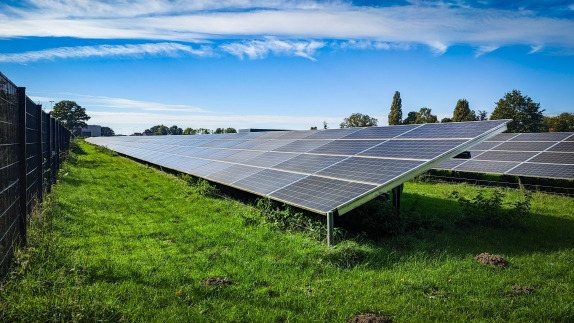Renewable energies
The expansion of renewable energy generation has a key role to play on the road to climate neutrality. By 2030, at least 80 per cent of the electricity consumed in Germany is to come from renewable energies. It will not be possible to achieve the goal of greenhouse gas neutrality and thus contribute to limiting global warming to 1.5 degrees by increasing efficiency and making savings alone. In Bocholt, it is therefore particularly important to utilise wind and solar energy much more than before. But water, biomass and geothermal energy can also contribute to the goal of climate neutrality.
Solar energy
Currently, 44 GWh = gigawatt hours of solar power are generated in Bocholt. This is currently mostly solar collectors on roof surfaces. In order to become climate-neutral, the amount of solar energy utilised must be increased eightfold. Homeowners, commercial and industrial companies, the public sector and owners of outdoor areas, including farmers, can contribute to this. It is also important for Bocholt to increase the number of solar thermal systems. These are systems that generate heat from sunlight instead of electricity. In this way, hot water for showers and heating can be produced on your own roof.
Ground-mounted PV systems
In addition to solar installations on roof surfaces, ground-mounted photovoltaic systems, or PV-FFA for short, can make a contribution to climate-neutral energy supply. The city of Bocholt has drawn up a special catalogue of criteria for the spatial control and technical evaluation of potential projects. The criteria contained in this catalogue include the issue of grid connection, municipal value creation and the aspect of citizen participation. In principle, urban land-use planning is required in Bocholt for the approval of a PV-FFA; exceptions may apply for systems in connection with agricultural operations in accordance with Section 35 BauGB.
Wind energy
Around 20 wind turbines are operated in Bocholt (as of 2024). They generate a total of 48.8 GWh of wind power per year. The turbines are mainly located in the four designated wind concentration zones in Hemden and Liedern. In order to become climate-neutral, the proportion of wind power produced in Bocholt must be increased many times over in the future. This can be achieved by repowering existing turbines to increase their output, but also by erecting new turbines in the urban area.
In order to ensure optimum spatial control and distribution of the turbines and to identify further potential areas, the WWK Partnerschaft für Umweltplanung office from Warendorf was commissioned to draw up a site concept for wind turbines in Bocholt. The concept is intended to serve as a decision-making aid as to where in the city area and under what conditions positive planning could be initiated.
As part of the site concept, the urban area is analysed on the basis of various criteria, such as development, natural environment and traffic. The result maps show possible potential areas in the form of "white areas" for wind energy in Bocholt. Due in particular to the high level of urban sprawl with numerous residential buildings in outlying areas, only limited additional potential sites are available in Bocholt.
In parallel, the administration will develop further criteria. In addition to the site requirements to be met, further conditions should be imposed on potential interested parties for the initiation of positive planning for wind turbines. These should help to promote acceptance among the population in particular. A draft of the catalogue of criteria is to be presented to the Committee for Planning, Construction and Transport at an upcoming meeting.
Hydropower
To generate energy from hydropower, a total of three hydropower plants are operated on the Bocholter Aa in Bocholt, which convert the water flow into energy at the Eisenhütte weir and near the Aasee lake.
Biogas
There are also several biogas plants in the city of Bocholt that generate CO2-neutral energy. Thanks to the high flexibility of production, energy can be supplied as required and, above all, support peak electricity.
Energy map of the Borken district
An overview of existing wind energy, ground-mounted PV, biogas and hydropower plants as well as further information can be found on the Borken district energy map:







